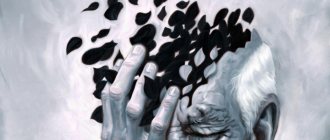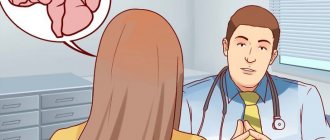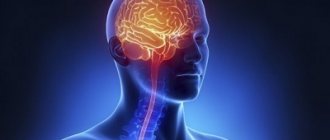From this article you will learn:
- What is senile dementia
- What are the causes of senile dementia
- What symptoms accompany senile dementia?
- Which doctor should I contact to treat senile dementia?
- What medications and drugs are used to treat senile dementia?
Senile, or senile, dementia, senile dementia are different names for the same disease of older people - dementia. It does not appear suddenly - its development occurs slowly, and at first, often neither the old people themselves nor their relatives can recognize the signs of emerging dementia. Dementia is a consequence of the destruction of brain cells in an aging organism, due to which a person’s mental abilities become poorer. For older people, the likelihood of suffering from this disease is high. 15-20% of those whose age crosses the border of 80-85 years develop signs of dementia. Let's find out how senile dementia is treated and what you should pay attention to.
What is senile dementia
Often, elderly people develop senile dementia, in other words, senile dementia. As already noted, the disease occurs due to the destruction and death of brain cells.
The fact is that in old age, many people’s bodies break down – there are disturbances in the functioning of all systems. The mental state also worsens. Mental disorders are divided into behavioral, cognitive, and emotional. All of them are associated with dementia to one degree or another, but cognitive impairment is more so. Generally speaking, the patient has a decreased expression of emotions, depressive states arise for no apparent reason, and a gradual disintegration of personality occurs.
We recommend
“Senile dementia: causes, symptoms, treatment” More details
Senile dementia does not develop immediately. Over time, the mental state of older people is disturbed, and personal qualities and characteristics that distinguish a person are lost. Deterioration of the condition leads to the total stage of the disease.
The initial stages of senile dementia may go unnoticed. Changes gradually occur in the behavior and character of the patient. Negative traits that appear are often accepted by relatives and friends as phenomena associated with old age. Negativism in the behavior of old people is expressed through stinginess, selfish behavior, conservative inclinations, a desire to teach and condemn others, especially if these traits are not typical for a person in general. But not everyone, observing such minor symptoms, will think about the occurrence of senile dementia.
What actions should the family take? It is necessary to monitor the level of mental abilities of grandparents. As senile dementia progresses, patients lose the ability to concentrate and think. This manifests itself in the fact that an elderly person cannot reason coherently, summarize what has been said, draw the right conclusions, and is not capable of analysis.
Personality degradation leads to the appearance of gross senile qualities: greed, callousness, anger, irritation and discontent. There are fewer interests. Losing analytical thinking, patients are increasingly inclined to stereotyped views on life. Senile dementia is characterized by manifestations of complacency and immoral behavior; the patient does not think about moral aspects, behaves carelessly and irresponsibly. If there were initially some peculiarities in sexual desire, sexual perversions may appear with dementia.
The memory of people with dementia can be surprising. Elderly people are often unable to remember how the day went, but they vividly and clearly describe the events of long ago. Many of them seem to live in the past: they remember their youth well, do not accept their age and feel young, can call their loved ones after childhood friends, can prepare for some kind of trip, travel.
At the same time, outwardly the disease does not make itself felt in any way, that is, facial expressions, gestures, habits, and spoken language remain the same. That is why it is so difficult to recognize the signs of an emerging disease and begin timely treatment of senile dementia - dementia, accordingly, progresses.
Stages of senile dementia
It is important to understand that dementia progresses quickly, so there is no point in waiting for it to go away on its own. This will only make the situation worse. Doctors distinguish three stages of the disorder.
- First (easy). The symptoms are mild, but intellectual activity is noticeably reduced. The person understands that he is sick and agrees to be treated. He is still able to take care of himself.
- Second (moderate). Intellectual impairments become more pronounced. Critical perception of one's own behavior decreases. It is difficult for the patient to use the kitchen stove, the front door, and light switches. If you are not constantly near him, he may harm himself.
- Third (heavy). The disintegration of personality is complete. A person cannot eat or wash himself. He does not understand who is talking to him, he is not able to think or remember. It often gets to the point that he cannot even chew food or walk.
Causes of senile dementia
The root cause of dementia is pathological disorders associated with structural changes in brain tissue. Secondary senile dementia can occur as a concomitant disease; it has a polyetiological nature. The primary form occurs in 90% of all cases, while the secondary form accounts for only 10%.
What can trigger the onset of senile dementia?:
- genetic factors;
- malfunctions of the circulatory system;
- traumatic brain injuries;
- diseases of viral etiology affecting the central nervous system;
- tumors of various types in the brain;
- high blood pressure;
- atherosclerosis;
- changes in metabolism;
- diseases associated with the destruction of immunity;
- endocrine diseases, hormonal imbalances;
- rheumatic diseases (diseases affecting connective tissues and joints);
- bad habits (smoking, drinking alcohol);
- poisoning with heavy metals (in particular, zinc, copper, aluminum);
- disorderly and uncontrolled use of medications (particular attention should be paid to the use of anticholinergics, antipsychotics, barbiturates);
- low physical activity, sedentary lifestyle, vitamin deficiency, especially B12;
- overweight, obesity.
About the disease
Senile warts are benign neoplasms that protrude above the skin and have a keratinized surface. Most often, their appearance can be observed after forty years. But there have been cases of growth of tumors in people of mature age.
Keratomas are dangerous because there is a risk of their degeneration into malignant tumors or squamous cell carcinoma. Therefore, you should not neglect such growths. It is better to consult a doctor, and if they do not pose any danger, carry out preventive diagnostics every few years. A senile wart does not go away on its own; the older a person gets, the greater the likelihood of noticing changes in the color, size, and contours of the growth. Males and females are equally susceptible to the disease.
Symptoms of senile dementia
The dynamics of the development of senile dementia are so weak that it is difficult to determine exactly when the first alarm bells appeared. The initial signs attract practically no attention; few people seriously think about small oddities in the behavior of older people. The onset of senile dementia can only be determined after a medical procedure - an MRI of the brain.
The symptoms of dementia are many and varied, and their manifestation depends on the stage of the disease. Such conditions are more common :
- The personality becomes more rude, negative character traits worsen, for example, a thrifty person turns into a stingy one.
- An elderly person with dementia increasingly “goes into the past”: he thinks as in the days of his youth, making no attempt to get along in the present. His actions correspond to the norms of the past. As the disease progresses, conservative behavior becomes pathological.
- At the initial stage of dementia, the patient is “pressured” by the desire to teach and instruct, it becomes increasingly difficult to conduct a dialogue with him, much less enter into an argument.
- Elderly people suffering from senile dementia are characterized by selfish traits that gradually become brighter. The circle of interests narrows as much as possible, the desire to learn new things and strive for something disappears.
- The ability to concentrate weakens, and it becomes increasingly difficult for an elderly person to analyze himself and the world around him.
- Increasingly, the patient cannot think objectively, individuality is lost, and thinking becomes stereotypical.
- Some old people acquire unpleasant character traits - embitterment, rudeness, callousness, tactlessness, grumpiness. They strive for conflict, are always unhappy, and are offended by everything. Another part of the patients, on the contrary, displays amazing carelessness, naivety and gentleness of character. Those suffering from senile dementia develop a tendency to talkatively. For patients with dementia, moral norms often lose their significance and moral boundaries are erased.
- There are deviations in sexual behavior - asexuality or the manifestation of perverted inclinations is possible.
- Senile dementia negatively affects memory. Patients remember events of the past well, but cannot concentrate on the present.
- Older people with dementia may become lost and forget where they are. They experience hallucinations that they cannot distinguish from reality. Attempts by relatives to prove the presence of pathological visions lead nowhere.
- It is possible to display causeless aggression towards their environment: patients become suspicious, do not trust anyone, and make unfounded accusations. Such situations put psychological pressure on family and friends.
When the disease completely takes over the body, the following neurological symptoms appear::
- pupils react worse to light;
- muscle tissue dies;
- fingers are shaking;
- the patient begins to shuffle his feet, the step becomes shorter;
- weight decreases rapidly;
- signs of insanity appear.
Types of senile dementia
So, the cause of dementia of any kind is disturbances in the structure of the brain. A number of diseases are associated with senile dementia. Based on which part of the brain cells begin to die, external signs of dementia can be determined:
- Violation of the integrity of structural connections in the cerebral cortex leads to a malfunction of higher nervous activity - conditioned and unconditioned reflexes, memory, logic, thought processes, speech, emotions. Dysfunctions of this kind are characteristic of Alzheimer's disease.
- Problems in the subcortex of the brain are followed by disturbances in the unconscious functions of the body: trembling of the hands and feet, nervous tics. These are signs of Parkinson's disease.
Recommended articles on this topic:
- Senile dementia: causes, symptoms, patient care
- Dementia in older people: symptoms and treatment
- Caring for older people with dementia: learning to build relationships
To determine the stages of senile dementia, it is necessary to assess the size of the affected nervous tissue of the brain:
- To a mild degree . An elderly person is able to lead a normal lifestyle, coordination and orientation in the area are not impaired. But in the social sphere, deviations are observed - the patient withdraws into himself, is not interested in the world around him and loved ones, often forgets something, and is absent-minded. At the same time, he recognizes the presence of problems and the need for treatment.
- To a moderate extent . At this stage, the patient needs help from relatives - he requires constant attention. Problems arise with memory and social and everyday behavior. The person has difficulty communicating, may forget how to use household appliances, and is poorly oriented in the area and in time. Therefore, the patient needs constant accompaniment; he cannot be left alone.
- Severely . At this stage, the personality is completely degraded, the person is not able to evaluate his activities or analyze his actions. Cannot perform simple daily activities and requires constant care. The functions of thinking and speech are lost. A patient with senile dementia does not recognize his relatives and loses control over the physiological functions of his body.
Varieties characteristic of persons over 65 years of age
- Vascular dementia (cerebral atherosclerosis)
- Atherosclerosis of cerebral vessels. Thickening of arterial walls associated with incorrect metabolism, expressed in the accumulation of lipids on the walls of blood vessels
- Developed after a stroke. Acute disruption of blood supply to the brain has a negative impact on thinking abilities
- Vascular damage due to chronic and systemic diseases. Often the result of an infectious or inflammatory process. Serious risk factors include previous vasculitis. Vascular forms account for approximately 15 percent of the total
- Atrophic varieties
- Consequence of Alzheimer's disease. It is characterized by gradual progression of disorders of nervous activity. Has three stages from mild forgetfulness to complete collapse of consciousness
- Pick's disease. Problems with emotional, personal and cognitive spheres are detected. The reason is cortical atrophy in certain parts of the brain
- Mixed. Triggered by several factors simultaneously. It occurs against the background of pathologies of various nature. For example, vascular senile sclerosis is often combined with Alzheimer's
Treatment of senile dementia and success depend on the stage. Highlight:
- Light;
- Moderate;
- Heavy.
With a mild degree, difficulties arise in professional activities and being in society. The perception of criticism and the ability to self-care are preserved. The moderate stage requires observation - important skills are significantly impaired. In severe cases, the patient requires constant monitoring and assistance. He loses the ability to maintain personal hygiene and is unaware of what is happening. The patient shows aggression, loses interest in relatives and life.
Which doctor should I contact to treat senile dementia?
At the first appearance of suspicious symptoms - short-term memory loss, changes in way of thinking, strange behavior, mood swings - a consultation with a therapist is necessary. After the examination, the doctor will assess the patient’s physical and mental condition, and if it turns out to be unsatisfactory, he will refer the patient to the appropriate specialist for diagnosis and treatment.
List of doctors whose specialization allows diagnosing senile dementia:
- geriatric psychiatrists study disorders in the mental and emotional state of elderly people, assess the functioning of memory and mental activity;
- neurologists deal with abnormal pathologies of the brain, disruptions in the functioning of the nervous system (their analysis and diagnosis are carried out based on testing of the nervous system and the results of ultrasound examinations of the brain (MRI)).
- neuropsychologists test the memory and intelligence of older people.
No blood tests can detect senile dementia. Its diagnosis is carried out using :
- tests that determine the level of intellectual abilities;
- assessment of the condition from neurology;
- ultrasound examinations of the brain;
- laboratory tests recognizing or denying that the presence of pathological signs from physiology relates to senile dementia;
- analysis of mental state - to exclude other mental disorders.
Identifying senile dementia in older people is not an easy task, so it is better for the patient to get advice from 2 or more doctors of different specialties.
What contributes to the development of dementia?
- depression
- depression
- yearning
- bad habits
- dependencies
- weak immunity
- social vulnerability
- loneliness
- poor quality food
People who lead an active lifestyle, carefully select their diet and follow a daily routine are less susceptible to senile dementia. The state of mind of a pensioner plays an important role. Lack of communication and bad mood bring senile dementia closer.
When the first signs of dementia appear, you need to consult a specialist. Experienced doctors are able to slow down the development of pathology.
Treatment of senile dementia: medications and drugs
Medicine divides dementia into three types:
- dementia due to neurodegenerative diseases (Alzheimer's, Parkinson's, Pick's diseases);
- vascular dementia (due to impaired blood circulation in the brain);
- mixed dementia.
We recommend
“Treatment of dementia in older people: drugs for different stages of the disease” Read more
- Dementia is most common in neurodegenerative diseases. Treatment of senile dementia of this type is based on the use of drugs - memantine and acetylcholinesterase inhibitors. At the same time, drugs are prescribed that regulate metabolism and vascular function, usually phosphatidylcholine. It has a slight positive effect on the functioning of neurons in the cerebral cortex. Additionally, medications are prescribed whose main active substances are Cerebrolysin and Actovegin.
- Vascular dementia, as mentioned above, appears as a result of a malfunction in the blood circulation of the brain, which, in turn, can be the result of a stroke, atherosclerosis, various heart defects, diabetes mellitus, and uncontrolled high blood pressure. Treatment of senile dementia of this type is carried out with anti-dementia medications, but under strict control of blood pressure, sugar and cholesterol levels. To prevent muscle tissue dystrophy, regular physical activity is required. It is necessary to add a course of antiplatelet agents - aspirin, clopidogrel. Doctors also prescribe the use of neuroprotectors, which improve the structure of brain tissue and help regulate metabolism in it. In some cases, vascular dementia is accompanied by a depressive state, then treatment is supplemented with antidepressants.
- Therapy for mixed type dementia requires an integrated approach. Its main goal is to eliminate problems in the body’s functioning and slow down the further development of the disease, which has caused the death of brain cells (statins and antiplatelet drugs are prescribed). The first task of treating this type of senile dementia is to stop pressure surges and take measures to prevent and exclude coronary heart disease. Treatment of all types of senile dementia includes not only medication, but also psychotherapy, music therapy, and occupational therapy in order to maintain social and everyday skills and physical activity in an elderly person.
When treating elderly people for senile dementia, care must be taken to ensure that they are safe and surrounded by comfort. It is common practice to install video surveillance at home so that patients are under constant supervision. People with dementia are prohibited from using gas and electric household appliances.
You cannot decide on your own which dementia treatment to choose. Only a doctor can do this. Medicines are started to be taken after determining the degree of the disease and assessing the harm caused to the body.
- To minimize the manifestations of senile dementia, anticholinesterase drugs (the main active ingredients are rivastigmine, hydrotartratexelon, galantamine) and memantine are prescribed for treatment. They have a positive effect on brain function and are indicated for the entire duration of the disease. These drugs have a neuroprotective effect; they block the death of neurons in the brain, improve the transmission of nerve impulses, due to which the patient’s memory and cognitive abilities are restored.
- To mitigate strange behavior, treatment is supplemented with antipsychotics, which have a calming effect on the psyche and prevent the occurrence of disorders - psychomotor agitation, hallucinations, delusions. Drugs based on quetiapine, haloperidol, olanzapine are taken under strict control, as they have side effects.
- For concomitant depressive disorder, antidepressants based on fluoxetine, fluvoxamine, maleate, mianserin and others are prescribed as treatment. They can cause side effects such as headaches and sudden changes in blood pressure.
- As a rule, those suffering from senile dementia are plagued by insomnia. In this case, sleeping pills are added to the main treatment. It is important to ensure that there is no overdose, since a high concentration of the drug, although calming, can also have a depressing effect on the excitability of nerve cells.
It is advisable that a patient with senile dementia receive the necessary vitamins with food. But this is more suitable for young and healthy people, because the body of elderly patients suffering from various ailments may not be able to cope with the absorption of vitamins in food. Therefore, it is better to take multivitamin complexes, which can be purchased at the pharmacy:
- “Alphabet 50+” contains 13 vitamins and 9 minerals in the required daily dosage for age. Take 3 times a day for a month, 1 tablet of different colors in the morning, lunch and evening, respectively.
- Vitrum Centuri has a rich composition - 13 vitamins and 17 minerals. It is recommended for use specifically by older people, as it is marked “50+”. Dosage regimen: 1 tablet 1 time per day, course – 3–4 months.
- "Centrum Silver" is a multicomponent vitamin complex consisting of more than 30 vitamins and minerals. If you take the drug regularly, it will improve the condition of blood vessels, help minimize age-related changes in the body, and increase cognitive abilities. Take 1 tablet per day with meals, course – 1–2 months.
When choosing vitamins, follow your doctor's recommendations. For older people, it is important to select the optimal dosage, since exceeding it can lead to unpleasant symptoms - headache, nausea, kidney and metabolic disorders.
What medicine to choose for senile dementia, the treatment of which will really bring results? Managing dementia at home starts with managing symptoms. We present a small list of medications that alleviate the condition of sick people:
- "Donepezil" . Increases intellectual abilities - memory improves, thinking becomes clearer, a person becomes more sociable and active. The drug promotes greater production of natural substances in the brain. It has a beneficial effect on the functions of memory and mental activity, inhibiting their degradation. Application: 1 time a day before bed, regardless of meals, preferably by the hour.
- "Rivastigmine" . It has a positive effect on memory and thinking, social behavior (communication and everyday life), and has an impact on the emotional state. Increases the level of the substance produced in the brain, due to which mental abilities are restored. The drug comes in two types: capsules and solution. Taken orally, 2 times a day – morning and evening with meals.
- "Akatinol memantine" . Eliminates pathological changes in the brain. Prevents the decline of memory and thinking functions, increases their level. Produced in tablets, solutions, capsules. The dosage regimen depends on the form of the drug: tablets and solution are taken 1–3 times a day, capsules – 1 time a day, regardless of meals, by the hour.
Even while undergoing home treatment, you can use these medications only after consulting a doctor, who will select the optimal dose based on the health status of the patient with senile dementia. Their action is based on eliminating the symptoms of dementia and stabilizing the condition, but some patients may experience individual intolerance to the components.
We recommend
“Vitamins for elderly people over 70: which ones are needed first” Read more
Treatment methods
Therapy is based on combating the main factor and relieving symptoms. For incurable subtypes of dementia, palliative measures are used. They are aimed at providing relief and slowing progression. Measures taken at an early stage produce positive results faster and easier.
Treatment methods for senile dementia in Moscow
Pharmacotherapy
Drugs are prescribed depending on the indications and general well-being. Typically includes cholinexterase inhibitors, anticonvulsants, antidepressants, antipsychotics
Psychosocial correction
Reminiscence therapy, sensory integration, and presence stimulation are recommended. The doctor’s task is to remind the patient of his identity, location, and stimulate feelings and emotions. Art therapy and music therapy indicated
Physiotherapeutic treatment of senile dementia
With senile dementia, trembling of the arms and legs, muscle spasms, tone, muscle rigidity, and loss of coordination often occur. For these conditions, it is recommended to add non-drug treatment to the medication intake - physiotherapy, exercise therapy, massage.
- Exercise therapy (complex physical therapy) includes special gymnastics that helps stabilize muscle tone and motor ability. Regular physical therapy will help prevent the occurrence of joint contractures. Effective exercises for patients with senile dementia:
— muscle relaxation, breathing manipulations;— development of the ability for motor coordination;
- work on the facial muscles;
- stretching exercises, developing muscle elasticity.
Treatment with exercise therapy stabilizes muscle tone, straightens posture, and helps to cope with trembling of the limbs. Exercises enable an elderly person to realize his physical capabilities, and he has a desire to develop them.
- Massage is useful for normalizing muscle tone, helps maintain the functions of the musculoskeletal system, and increases blood flow to the extremities. Massage has always had a beneficial effect on well-being and mood. The complex for those suffering from dementia includes stroking, kneading and rubbing movements, followed by vibration and displacement. The course of treatment is 10–14 procedures, every other day.
- Treatment of senile dementia with physiotherapy helps to normalize metabolism and blood circulation in the body, and has a reflex effect on the functionality of the brain. After a course of treatment, older people move better, depression subsides, and mental function is activated.
Procedures that give the best results:
- hydrotherapy, medicinal baths;
- muscle electrical stimulation;
- electrosleep.
Physiotherapy treatment blocks the development of senile dementia. This is a good way out of a situation where the use of medications is contraindicated.












